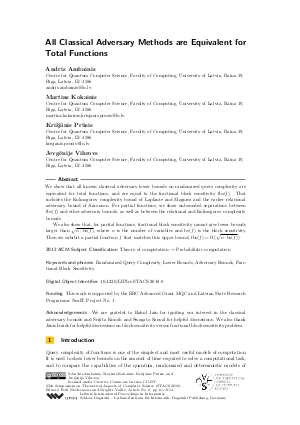All Classical Adversary Methods are Equivalent for Total Functions
Authors Andris Ambainis, Martins Kokainis, Krisjanis Prusis, Jevgenijs Vihrovs
-
Part of:
Volume:
35th Symposium on Theoretical Aspects of Computer Science (STACS 2018)
Part of: Series: Leibniz International Proceedings in Informatics (LIPIcs)
Part of: Conference: Symposium on Theoretical Aspects of Computer Science (STACS) - License:
 Creative Commons Attribution 3.0 Unported license
Creative Commons Attribution 3.0 Unported license
- Publication Date: 2018-02-27
File

PDF
LIPIcs.STACS.2018.8.pdf
- Filesize: 0.51 MB
- 14 pages
Document Identifiers
Subject Classification
Keywords
- Randomized Query Complexity
- Lower Bounds
- Adversary Bounds
- Fractional Block Sensitivity
Metrics
- Access Statistics
-
Total Accesses (updated on a weekly basis)
0PDF Downloads0Metadata Views
Abstract
We show that all known classical adversary lower bounds on randomized query complexity are equivalent for total functions, and are equal to the fractional block sensitivity fbs(f). That includes the Kolmogorov complexity bound of Laplante and Magniez and the earlier relational adversary bound of Aaronson. For partial functions, we show unbounded separations between fbs(f) and other adversary bounds, as well as between the relational and Kolmogorov complexity bounds. We also show that, for partial functions, fractional block sensitivity cannot give lower bounds larger than sqrt(n * bs(f)), where n is the number of variables and bs(f) is the block sensitivity. Then we exhibit a partial function f that matches this upper bound, fbs(f) = Omega(sqrt(n * bs(f))).
Cite As Get BibTex
Andris Ambainis, Martins Kokainis, Krisjanis Prusis, and Jevgenijs Vihrovs. All Classical Adversary Methods are Equivalent for Total Functions. In 35th Symposium on Theoretical Aspects of Computer Science (STACS 2018). Leibniz International Proceedings in Informatics (LIPIcs), Volume 96, pp. 8:1-8:14, Schloss Dagstuhl – Leibniz-Zentrum für Informatik (2018)
https://doi.org/10.4230/LIPIcs.STACS.2018.8
BibTex
@InProceedings{ambainis_et_al:LIPIcs.STACS.2018.8,
author = {Ambainis, Andris and Kokainis, Martins and Prusis, Krisjanis and Vihrovs, Jevgenijs},
title = {{All Classical Adversary Methods are Equivalent for Total Functions}},
booktitle = {35th Symposium on Theoretical Aspects of Computer Science (STACS 2018)},
pages = {8:1--8:14},
series = {Leibniz International Proceedings in Informatics (LIPIcs)},
ISBN = {978-3-95977-062-0},
ISSN = {1868-8969},
year = {2018},
volume = {96},
editor = {Niedermeier, Rolf and Vall\'{e}e, Brigitte},
publisher = {Schloss Dagstuhl -- Leibniz-Zentrum f{\"u}r Informatik},
address = {Dagstuhl, Germany},
URL = {https://drops.dagstuhl.de/entities/document/10.4230/LIPIcs.STACS.2018.8},
URN = {urn:nbn:de:0030-drops-84953},
doi = {10.4230/LIPIcs.STACS.2018.8},
annote = {Keywords: Randomized Query Complexity, Lower Bounds, Adversary Bounds, Fractional Block Sensitivity}
}
Author Details
References
-
Scott Aaronson. Lower bounds for local search by quantum arguments. SIAM Journal on Computing, 35(4):804-824, 2006.

-
Scott Aaronson. Quantum certificate complexity. Journal of Computer and System Sciences, 74(3):313-322, 2008.

-
Scott Aaronson, Shalev Ben-David, and Robin Kothari. Separations in query complexity using cheat sheets. In Proceedings of the Forty-eighth Annual ACM Symposium on Theory of Computing, STOC'16, pages 863-876, New York, NY, USA, 2016. ACM.

-
Andris Ambainis. Quantum lower bounds by quantum arguments. In Proceedings of the Thirty-second Annual ACM Symposium on Theory of Computing, STOC'00, pages 636-643, New York, NY, USA, 2000. ACM.

-
Andris Ambainis. Polynomial degree vs. quantum query complexity. In Proceedings of the 44th Annual IEEE Symposium on Foundations of Computer Science, FOCS'03, pages 230-239, Washington, DC, USA, 2003. IEEE Computer Society.

- Andris Ambainis, Martins Kokainis, Krisjanis Prusis, and Jevgenijs Vihrovs. All classical adversary methods are equivalent for total functions. CoRR, abs/1709.08985, 2017. URL: http://arxiv.org/abs/1709.08985.
-
Robert Beals, Harry Buhrman, Richard Cleve, Michele Mosca, and Ronald de Wolf. Quantum lower bounds by polynomials. Journal of the ACM, 48(4):778-797, 2001.

-
Shalev Ben-David and Robin Kothari. Randomized query complexity of sabotaged and composed functions. In 43rd International Colloquium on Automata, Languages, and Programming (ICALP 2016), volume 55 of Leibniz International Proceedings in Informatics (LIPIcs), pages 60:1-60:14, Dagstuhl, Germany, 2016. Schloss Dagstuhl-Leibniz-Zentrum fuer Informatik.

-
Harry Buhrman and Ronald de Wolf. Complexity measures and decision tree complexity: a survey. Theoretical Computer Science, 288(1):21-43, 2002.

-
Justin Gilmer, Michael Saks, and Srikanth Srinivasan. Composition limits and separating examples for some Boolean function complexity measures. Combinatorica, 36(3):265-311, 2016.

-
Peter Hoyer, Troy Lee, and Robert Spalek. Negative weights make adversaries stronger. In Proceedings of the Thirty-ninth Annual ACM Symposium on Theory of Computing, STOC'07, pages 526-535, New York, NY, USA, 2007. ACM.

-
Rahul Jain and Hartmut Klauck. The partition bound for classical communication complexity and query complexity. In Proceedings of the 2010 IEEE 25th Annual Conference on Computational Complexity, CCC'10, pages 247-258, Washington, DC, USA, 2010. IEEE Computer Society.

-
Raghav Kulkarni and Avishay Tal. On fractional block sensitivity. Chicago Journal Of Theoretical Computer Science, 8:1-16, 2016.

-
Sophie Laplante and Frédéric Magniez. Lower bounds for randomized and quantum query complexity using Kolmogorov arguments. In Proceedings of the 19th IEEE Annual Conference on Computational Complexity, CCC'04, pages 294-304, Washington, DC, USA, 2004. IEEE Computer Society.

-
Ming Li and Paul M.B. Vitnyi. An Introduction to Kolmogorov Complexity and Its Applications. Springer Publishing Company, Incorporated, 3 edition, 2008.

-
Noam Nisan. CREW PRAMs and decision trees. In Proceedings of the Twenty-first Annual ACM Symposium on Theory of Computing, STOC'89, pages 327-335, New York, NY, USA, 1989. ACM.

-
Noam Nisan and Mario Szegedy. On the degree of Boolean functions as real polynomials. Computational Complexity, 4(4):301-313, 1994.

-
Ben W. Reichardt. Span programs and quantum query complexity: The general adversary bound is nearly tight for every Boolean function. In Proceedings of the 2009 50th Annual IEEE Symposium on Foundations of Computer Science, FOCS'09, pages 544-551, Washington, DC, USA, 2009. IEEE Computer Society.

-
Robert Špalek and Mario Szegedy. All quantum adversary methods are equivalent. Theory of Computing, 2(1):1-18, 2006.

-
Avishay Tal. Properties and applications of Boolean function composition. In Proceedings of the 4th Conference on Innovations in Theoretical Computer Science, ITCS'13, pages 441-454, New York, NY, USA, 2013. ACM.

-
Andrew Chi-Chin Yao. Probabilistic computations: Toward a unified measure of complexity. In 18th Annual Symposium on Foundations of Computer Science, pages 222-227, 1977.

